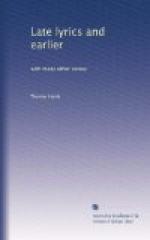Why go the south road now?
That way marched they some are forgetting,
Stark to the moon left, past regretting
Loves who have falsed their vow
. . .
Why go the south road now?
Why go any road now?
White stands the handpost for brisk on-bearers,
“Halt!” is the word for wan-cheeked farers
Musing on Whither, and How . . .
Why go any road now?
“Yea: we want new feet
now”
Answer the stones. “Want chit-chat, laughter:
Plenty of such to go hereafter
By our tracks, we trow!
We are for new feet now.
During the War.
PENANCE
“Why do you sit, O pale thin man,
At the end of the room
By that harpsichord, built on the quaint old plan?
—It is cold as a tomb,
And there’s not a spark within the grate;
And the jingling wires
Are as vain desires
That have lagged too late.”
“Why do I? Alas, far times ago
A woman lyred here
In the evenfall; one who fain did so
From year to year;
And, in loneliness bending wistfully,
Would wake each note
In sick sad rote,
None to listen or see!
“I would not join. I would not stay,
But drew away,
Though the winter fire beamed brightly . . .
Aye!
I do to-day
What I would not then; and the chill old keys,
Like a skull’s brown teeth
Loose in their sheath,
Freeze my touch; yes, freeze.”
“I LOOK IN HER FACE” (SONG: Minor)
I look in her face and say,
“Sing as you used to sing
About Love’s blossoming”;
But she hints not Yea or Nay.
“Sing, then, that Love’s a pain,
If, Dear, you think it so,
Whether it be or no;”
But dumb her lips remain.
I go to a far-off room,
A faint song ghosts my ear;
which song I cannot hear,
But it seems to come from a tomb.
AFTER THE WAR
Last Post sounded
Across the mead
To where he loitered
With absent heed.
Five years before
In the evening there
Had flown that call
To him and his Dear.
“You’ll never come back;
Good-bye!” she had said;
“Here I’ll be living,
And my Love dead!”
Those closing minims
Had been as shafts darting
Through him and her pressed
In that last parting;
They thrilled him not now,
In the selfsame place
With the selfsame sun
On his war-seamed face.
“Lurks a god’s laughter
In this?” he said,
“That I am the living
And she the dead!”
“If you had known”
If you had known
When listening with her to the far-down moan
Of the white-selvaged and empurpled sea,
And rain came on that did not hinder talk,
Or damp your flashing facile gaiety
In turning home, despite the slow wet walk
By crooked ways, and over stiles of stone;
If you had known




